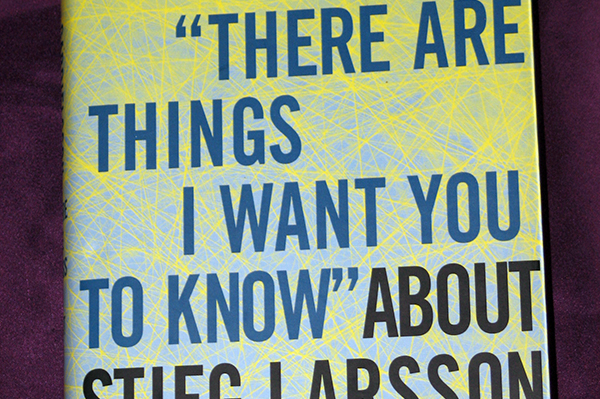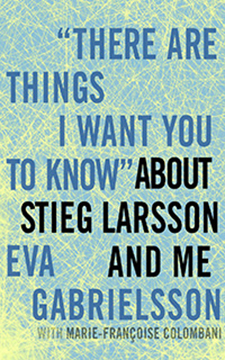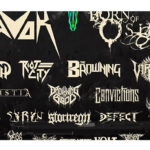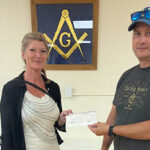Home »

A rewarding book and useful read
Book Review
By Derryll White
Gabrielsson, Eva (2011). “There Are Things I Want You to Know” About Stieg Larrson and Me.
 A friend just loaned me this book and said “Read this.” I have read the Larrson ‘Millennium Trilogy’ and was aware of “There Are Things…” and the questions it raises. It came out just before I left for two months in Sweden and people were talking about it then. Generally they seemed to support Eva and were perplexed about the legal troubles she was experiencing after the death of Stieg Larrson. But the book was lost to me in a flurry of other, more pressing things. I am thankful that one of my reading friends decided to catch me up.
A friend just loaned me this book and said “Read this.” I have read the Larrson ‘Millennium Trilogy’ and was aware of “There Are Things…” and the questions it raises. It came out just before I left for two months in Sweden and people were talking about it then. Generally they seemed to support Eva and were perplexed about the legal troubles she was experiencing after the death of Stieg Larrson. But the book was lost to me in a flurry of other, more pressing things. I am thankful that one of my reading friends decided to catch me up.
This is an informative book. Stieg Larrson burst onto the English-speaking landscape with little background attached. ‘The Girl With the Dragon Tattoo’ was an instant smash hit, and the remaining volumes of the Millennium Trilogy just sustained the wave. I was aware that the author had to be politically involved in his private life – how else could he have produced the political insights and feelings that are throughout his volumes? But I did not realize how involved he was.
My visit to Sweden demonstrated to me just how present politics are in Swedish daily life. Every coffee shop buzzed with debate and in any public gathering Swedes unabashedly demanded from their elected representatives honest answers to questions we don’t even ask publicly in Canada. What are your views on immigration? What about the disparity of wealth that is growing in this country? What are you prepared to do about poverty?
Eva offers very informative background on Larrson, the kind of thing that lets a reader begin to understand the depths of the Trilogy’s major character, Mikael Blomkvist. The self-reliance and independence of Blomkvist came directly out of Larrson’s early years, growing up rurally with his grandparents.
Gabrielsson very ably shows how Larrson’s young adulthood, through his twenties, formed the political idealism and drive exhibited in the character Blomkvist. It is one of the things that separates Sweden from Canada, the ever-present politicization of life. I got caught up in a May Day parade in a very small town, and still over 400 people paraded. And even more participated in the public interrogation of the local member of the national assembly after the parade. Swedes are passionate and everywhere wanted to know how Canadians put up with Harper.
Gabrielsson clarifies themes running throughout the Millennium Trilogy – political scandals, oppression of women, degradation of Swedish society – and charts their place in Larrson’s own life. Her book is a very insightful read, after having read ‘The Girl With the Dragon Tattoo’ and its successors.
Having gone through the political wars and changes in factional Swedish society with Larrson, Gabrielsson reads very credibly when she discusses the challenges Sweden faces with racism, growing economic concentration of wealth, and the political malaise spreading throughout Sweden now. She keeps Larrson’s incessant search for the truth in journalism and life to the forefront.
Eva Gabrielsson points out that Larrson preferred the company of women to that of men. He found women less conniving than men, less overtly ambitious and more creative. Perhaps that is one reason I enjoyed his books so much. I also prefer the company of women.
She also points out some interesting facts regarding Swedish society, such as the fact that church and state were not separated in Sweden until 2000. So the Old Testament echoes in some of Lisbeth Solander’s actions, reaching back to Larrson’s early childhood in rural northern Sweden where a person’s direct relationship with God was a given. This sense of personal responsibility is, in Gabrielsson’s words, what drives the plot in the Millennium Trilogy.
In the end I found this to be a very rewarding book, and think it a useful read for anyone who has read and enjoyed the Millennium Trilogy. Eva Gabrielsson places the large work within the context of contemporary Sweden. Perhaps even more useful, at least to me, she illuminates the parts of the Nordic character that inform all three volumes. Her four-page niõ curse near the end of the book sums up that wonderful part of the Swedish past that still moves forward among thoughtful, thinking Swedes. Now I think I must go and read the Millennium Trilogy again!
Excerpts from the book:
COFFEE – Coffee was for both of us an extraordinary remedy for all kinds of misfortunes great or small. Synonymous with intimacy, conviviality, hospitality, it accompanied our moments of happiness as well as our long, long conversations with each other or friends.
OLD WAYS – We were taught old-fashioned values, a strict and sometimes severe morality. In our homes, an honourable reputation did not depend on money and success, but on integrity. Once given, a person’s word was sacred. These rules were inviolable.
RACISM – In the 1990s, more than a dozen people were murdered in Sweden for political reasons by individuals involved with neo-Nazi groups. Säpo – the Security Service, an arm of the Swedish National Police – estimated that during 1998 alone, there were more than two thousand unprovoked racist attacks, more than half of which can be directly linked to neo-Nazi militants in White Power groups.
THE CURSE –
All sorts for you
In suits, ties and wingtips
This niò is for you
I hope
That the trickster Loki spellbinds your eyes
So you will see only enemies around you forevermore
And you will all cut one another down.
 – Derryll White once wrote books but now chooses to read and write about them. When not reading he writes history for the web at www.basininstitute.org.
– Derryll White once wrote books but now chooses to read and write about them. When not reading he writes history for the web at www.basininstitute.org.







